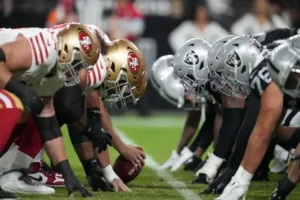
Green Bay Packers running back Josh Jacobs recently appeared on the Bussin’ With the Boys podcast, where he opened up about his difficult time with the Las Vegas Raiders. Despite being highly productive—rushing for over 1,000 yards in three seasons and leading the NFL in 2022 with 1,653 yards—Jacobs struggled with the instability of the organization.
As Eva Geitheim of Sports Illustrated notes, Jacobs experienced frequent turnover in leadership during his time in Las Vegas. Over the course of his Raiders career, he played under four head coaches—Jon Gruden, Rich Bisaccia, Josh McDaniels, and Antonio Pierce—and dealt with a rotating cast of general managers, including Mike Mayock, Dave Ziegler, interim GM Champ Kelly, and Tom Telesco. This revolving door of leadership made it hard for Jacobs to find stability or feel truly valued.

Jacobs was deeply invested in the franchise. He bought a home in the area and got involved in the local community, but despite his efforts, he eventually felt disrespected by the organization. That feeling only grew as new coaches questioned his value and past performance, treating him as if he were still unproven. He was particularly upset about being asked to play in the Hall of Fame game, then only being appreciated once the team began losing and needed him. Even after performing well, the team placed the franchise tag on him instead of offering a long-term deal.
Though Jacobs didn’t name names, he mentioned that someone within the Raiders’ leadership repeatedly spoke about him behind his back, and those comments eventually got back to him. However, he was clear that team owner Mark Davis was not part of the problem and still holds his respect.
Jacobs emphasized his significant contribution to the team, saying he was essentially 65% of the offense, yet the team refused to compensate him accordingly. He expressed how painful it was to want to stay, do everything right, and still be shown the door.
While joining the Packers may be a football upgrade—with a stronger roster, organizational stability, and a better shot at success—it doesn’t erase the sting of feeling unappreciated by the team that drafted him. Moving teams isn’t just a business decision—it involves uprooting your life, selling your home, and relocating your family. That emotional toll can’t be ignored.







